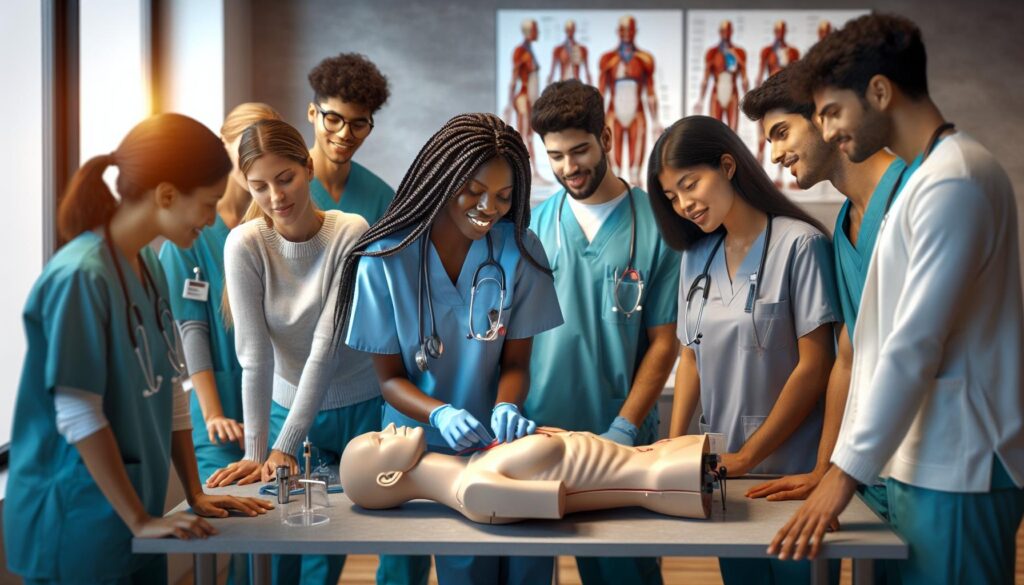
Making the transition from health science to nursing represents a natural progression for many healthcare students. While both fields share foundational knowledge in anatomy, physiology and medical terminology the switch to nursing offers a more direct path to patient care.
Students considering this career pivot often discover that their health science background provides valuable advantages. Many prerequisite courses overlap between the two programs and the scientific foundation from health science studies can make nursing concepts easier to grasp. However the switch requires careful planning including understanding admission requirements verification of transferable credits and potential additional coursework needed for nursing program eligibility.
Can I Switch from Health Science to Nursing
The transition from health science to nursing builds on existing healthcare knowledge while introducing specialized clinical skills. This pathway leverages previous academic experiences in healthcare studies to create a focused route toward nursing practice.
Common Health Science Degrees and Their Overlap With Nursing
Health science degrees share significant coursework with nursing prerequisites, creating natural transition points. Bachelor’s degrees in Exercise Science, Biology, Health Studies or Public Health contain overlapping fundamental courses:
- Anatomy & Physiology I and II with lab components
- Chemistry foundations with clinical applications
- Microbiology including infection control principles
- Human Development across the lifespan
- Medical terminology and documentation
- Introductory psychology and sociology
Key Differences Between Health Science and Nursing Programs
Nursing programs emphasize hands-on clinical skills and direct patient care compared to health science’s broader theoretical approach:
| Aspect | Health Science | Nursing |
|---|---|---|
| Clinical Hours | 0-100 observation hours | 600-1000 direct care hours |
| Skills Focus | Research methodology | Patient assessment & procedures |
| Course Format | Primarily lecture-based | Combined lecture & clinical labs |
| Program Length | 4 years | 2-4 years post-prerequisites |
| Certification | Optional specialty certs | Required NCLEX licensure |
- Medication administration protocols
- Physical assessment techniques
- Clinical decision-making processes
- Patient care documentation systems
- Healthcare team communication methods
- Evidence-based nursing interventions
Prerequisites and Requirements for Switching to Nursing
Transitioning from health science to nursing requires meeting specific academic and clinical prerequisites established by nursing programs and state boards of nursing. These requirements ensure students possess the necessary foundation for success in nursing education.
Academic Requirements and Prerequisites
A health science to nursing transition demands completion of essential prerequisite courses with minimum GPA requirements:
- Maintain a cumulative GPA of 3.0 or higher in prerequisite courses
- Complete anatomy & physiology I & II with laboratory components
- Pass microbiology with lab (4 credit hours)
- Finish chemistry with lab (4 credit hours)
- Complete statistics (3 credit hours)
- Pass developmental psychology (3 credit hours)
- Submit official transcripts from all previous institutions
| Common Prerequisite Course | Credit Hours | Minimum Grade Required |
|---|---|---|
| Anatomy & Physiology I | 4 | B |
| Anatomy & Physiology II | 4 | B |
| Microbiology | 4 | C+ |
| Chemistry | 4 | C+ |
| Statistics | 3 | C |
| Psychology | 3 | C |
Clinical Experience Requirements
Clinical prerequisites focus on hands-on healthcare exposure:
- Complete Basic Life Support (BLS) certification
- Pass required immunizations & health screenings
- Obtain background check clearance
- Complete drug screening
- Document 100+ hours of healthcare experience through:
- Volunteer work in hospitals
- Certified Nursing Assistant (CNA) experience
- Emergency Medical Technician (EMT) service
- Medical scribing
- Patient care technician roles
The clinical requirements establish practical exposure to healthcare settings while meeting regulatory standards for nursing education programs.
Pathway Options for Health Science Graduates
Health science graduates have multiple pathways to transition into nursing through specialized programs designed for degree holders. These programs accommodate different academic backgrounds while optimizing the time to complete nursing credentials.
Accelerated BSN Programs
Accelerated BSN programs enable health science graduates to earn a nursing degree in 12-18 months. Students complete intensive coursework that builds on their existing science foundation through:
- Full-time clinical rotations in diverse healthcare settings
- Compressed nursing theory courses covering essential competencies
- Integration of previous science credits into the nursing curriculum
- Year-round study with minimal breaks between terms
- Direct patient care experience starting from the first semester
| Program Component | Traditional BSN | Accelerated BSN |
|---|---|---|
| Program Length | 4 years | 12-18 months |
| Prerequisites | High school diploma | Bachelor’s degree |
| Clinical Hours | 700-800 | 800-1000 |
| Course Load | Standard | Intensive |
Direct Entry MSN Programs
Direct Entry MSN programs allow health science graduates to earn a Master’s in Nursing without a prior nursing degree. These programs offer:
- Advanced nursing credentials in 2-3 years
- Specialized tracks in nursing education administration or clinical practice
- Combined BSN MSN curriculum with streamlined progression
- Clinical placements focused on leadership roles
- Preparation for both RN licensure APRN certification
- Dual credentials as an RN advanced practice nurse
- Previous coursework applied toward prerequisites
- Selected specialty concentration
- Full-time versus part-time enrollment
- Clinical placement availability
- State licensing requirements
Benefits of Transitioning From Health Science to Nursing
Transitioning from health science to nursing opens up diverse career opportunities in healthcare. The move combines existing scientific knowledge with specialized clinical skills to create a rewarding professional path.
Career Advancement Opportunities
A nursing career provides multiple advancement paths in clinical practice, education and leadership roles:
- Earn specialized certifications in areas like critical care, pediatrics or oncology
- Advance to nurse practitioner roles with additional graduate education
- Move into nursing management positions overseeing clinical departments
- Teach future nurses as a clinical instructor or nursing faculty member
- Pursue research opportunities at healthcare institutions
- Work in diverse settings including hospitals, clinics, schools or corporations
- Travel as a nurse to different healthcare facilities nationwide
Transferable Skills and Knowledge
Health science graduates enter nursing with valuable foundational skills that enhance their nursing education:
- Applied understanding of human anatomy and physiology concepts
- Experience with medical terminology and healthcare communication
- Knowledge of disease processes and pathophysiology
- Familiarity with healthcare systems and operations
- Research and scientific methodology expertise
- Critical thinking abilities developed through science coursework
- Experience working with healthcare technology and documentation
- Understanding of public health principles and preventive care
- Background in healthcare ethics and patient privacy regulations
- Proficiency in analyzing scientific literature and evidence-based practice
The combined knowledge creates a strong foundation for excelling in nursing clinical skills while maintaining a broader healthcare perspective gained through health science education.
Steps to Make the Switch Successfully
Transitioning from health science to nursing requires strategic planning and careful execution. Here’s a detailed breakdown of essential steps to ensure a smooth transition.
Meeting With Academic Advisors
Academic advisors provide critical guidance for health science students transitioning to nursing programs. They analyze transcript evaluations to identify transferable credits from previous coursework in anatomy, physiology, chemistry, and psychology. Advisors map out specific requirements for nursing program admission, including:
- Reviewing prerequisite completion status
- Calculating current GPA against program requirements
- Identifying gaps in coursework or clinical experience
- Exploring program-specific admission criteria
- Evaluating financial aid opportunities or scholarship options
- Application deadlines for target nursing programs
- Required entrance exam dates (TEAS or HESI)
- Completion dates for outstanding prerequisites
- Clinical experience hour accumulation targets
- Documentation submission deadlines:
- Letters of recommendation
- Health records
- Background checks
- CPR certification
| Timeline Component | Typical Duration | Priority Level |
|---|---|---|
| Prerequisite Completion | 6-12 months | High |
| Entrance Exam Prep | 3-4 months | High |
| Clinical Hours | 3-6 months | Medium |
| Application Process | 2-3 months | High |
| Document Collection | 1-2 months | Medium |
Specific Program Requirements
Transitioning from health science to nursing represents a viable and rewarding career path for students seeking direct patient care roles. The strong academic foundation from health science programs provides valuable advantages when pursuing nursing education through various pathways like Accelerated BSN or Direct Entry MSN programs.
Success in this transition requires careful planning systematic preparation and dedication to meeting specific program requirements. With proper guidance from academic advisors and a clear understanding of prerequisites students can effectively navigate this career shift while building upon their existing healthcare knowledge.
The journey from health science to nursing opens doors to diverse professional opportunities and allows individuals to leverage their broad healthcare perspective in delivering patient-centered care. This natural progression enables students to transform their theoretical understanding into practical clinical expertise.













